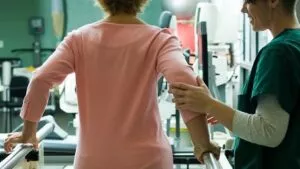INPATIENT SPINAL REHABILITATION
According to the doctors, rehab is designed to strengthen a patient to begin the functions and activities of enjoying every day life. Furthermore, rehab also educates patients about back safety and precautions they should take until they are ready to not wear the back brace.
When inpatient rehabilitation is necessary, we recommend a rehabilitation hospital that will work hard to get you back to enjoying life — the way you want to
Prior to Surgery
When it comes to the very best, Southwest Scoliosis and Spine Institute’s board-certified, fellowship-trained orthopedic doctors, Richard Hostin, MD, Devesh Ramnath, MD, Ishaq Syed, MD, Shyam Kishan, MD, and Kathryn Wiesman, MD , have years of experience treating thousands of patients with complex spine problems. In order to make sure we have everything in order for your upcoming surgery, we have devised a list of tests and appointments needed prior to surgery. In addition, our staff will guide you through the pre-surgery process.
Prior to surgery, the doctor will examine you to ensure that you are healthy enough for your spine surgery. Also, our staff can help you make arrangements for your testing, which may include:
- Chest X-ray, EKG, bloodwork (mandatory)
- Cardiac stress test or lung function test
- Imaging tests (MRI, CT scan, etc.)
Questions and Answers
How long will my stay be in the Rehabilitation Hospital?
The length of your rehabilitation stay varies depending on several factors, including the nature and complexity of your condition. In addition, the length depends on your progress in therapy, and your individual needs and goals. While some individuals may require a shorter stay, others with more complex conditions may require a longer stay. Your healthcare team will continually assess your progress. They will work with you to determine the most appropriate duration for your rehabilitation stay.
Why do I need to go to a Rehabilitation Hospital?
Rehabilitation hospitals provide specialized care for individuals who require intensive rehabilitation from an illness, injury, or surgery. The primary reasons for admission to a rehabilitation hospital include:
- Stroke: Rehabilitation hospitals offer comprehensive programs to help individuals regain function and independence after a stroke. They address physical, cognitive, and communication challenges.
- Orthopedic Surgery: Following joint replacements, spinal surgery, or other orthopedic procedures, rehabilitation hospitals focus on restoring mobility, strength, and flexibility.
- Traumatic Brain Injury: Rehabilitation hospitals are equipped to provide intensive rehabilitation for individuals with traumatic brain injuries. The staff helps them regain cognitive function, motor skills, and independence.
- Spinal Cord Injury: Rehabilitation hospitals specialize in spinal cord injury rehabilitation, focusing on maximizing functional independence, improving mobility, and enhancing quality of life.
Rehabilitation hospitals have the expertise, multidisciplinary teams, and resources to address specific medical conditions. They provide intensive rehabilitation to facilitate recovery and optimize outcomes.
What can I expect when I go to a Rehabilitation Hospital?
During your stay at a rehabilitation hospital, you can expect:
- Comprehensive Assessment: The rehabilitation team will conduct a thorough evaluation to assess your physical, cognitive, and functional abilities, as well as identify specific rehabilitation goals.
- Individualized Treatment Plan: Based on the assessment, a personalized treatment plan will be developed to address your unique needs and goals. This plan may include physical therapy, occupational therapy, speech therapy, and other specialized therapies as required.
- Intensive Rehabilitation: Rehabilitation hospitals offer intensive therapy sessions several hours a day, typically focusing on improving strength, coordination, balance, mobility, and activities of daily living.
- Multidisciplinary Care: You will receive care from a team of healthcare professionals, including physicians, nurses, therapists, and other specialists who collaborate to provide coordinated and comprehensive care throughout your stay.
- Education and Support: Rehabilitation hospitals provide education and support to help you and your family understand your condition, manage your care, and prepare for a successful transition back to your home or community.
The duration of your stay will depend on your condition, progress, and rehabilitation goals, which will be regularly reviewed and adjusted by your healthcare team.
After Spine Surgery
After spine surgery, patients can expect a recovery process that involves several phases and varies depending on the type of surgery performed, the extent of the procedure, and individual factors. While each patient’s experience may differ, here are some general expectations after spine surgery:
Hospital Stay
Following spine surgery, patients typically stay in the hospital for a few days. The duration of the hospital stay depends on the specific procedure and the patient’s overall condition. During this time, medical professionals closely monitor the patient’s vital signs, manage pain, administer medications, and assist with mobility and self-care.
Postoperative Pain:
It is normal to experience pain or discomfort after spine surgery. The level and duration of pain can vary depending on the surgical procedure. The medical team will provide appropriate pain management strategies, including medications, to help alleviate discomfort during the initial recovery period.
Restricted Activities:
Patients are typically advised to limit certain activities and movements during the early stages of recovery. This may include restrictions on bending, lifting heavy objects, or participating in strenuous physical activities. Following the surgeon’s instructions and adhering to activity restrictions is essential to promote proper healing and prevent complications.
Physical Therapy and Rehabilitation:
In most cases, patients will undergo physical therapy and rehabilitation as part of their recovery process. Physical therapists will guide patients through exercises and movements aimed at improving strength, flexibility, and mobility. Rehabilitation programs may include various modalities, such as stretching, strengthening exercises, and gait training, tailored to the specific needs of the patient.
Follow-Up Appointments:
Patients will have follow-up appointments with their surgeon to assess the progress of their recovery. These appointments allow the surgeon to monitor healing, review imaging studies, and make any necessary adjustments to the treatment plan. The frequency of follow-up visits will vary depending on the individual’s condition and the specific surgery performed.
Gradual Return to Normal Activities:
 The timeline for returning to normal activities varies from patient to patient and depends on the type of surgery performed. Some patients may resume daily activities relatively quickly, while others may require a longer recovery period before gradually returning to work, hobbies, and exercise.
The timeline for returning to normal activities varies from patient to patient and depends on the type of surgery performed. Some patients may resume daily activities relatively quickly, while others may require a longer recovery period before gradually returning to work, hobbies, and exercise.
It’s important for patients to follow their surgeon’s instructions, adhere to prescribed medications, attend all recommended appointments, and communicate any concerns or changes in symptoms to their healthcare team. Each patient’s recovery journey is unique, and the specific expectations and timeline will be discussed in detail by the surgeon and medical professionals involved in the patient’s care.
The Purpose of an Inpatient Rehabilitation Hospital
An inpatient rehabilitation Hospital provides specialized care and comprehensive rehabilitation services to individuals who require intensive rehabilitation due to an illness, injury, or surgery. These hospitals are designed to help patients recover, regain function, and improve their overall quality of life. Here are some key purposes of an inpatient rehabilitation hospital:
Multidisciplinary Rehabilitation
Inpatient rehabilitation hospitals have a team of healthcare professionals, including physicians, nurses, physical therapists, occupational therapists, speech-language pathologists, and other specialists. They work collaboratively to provide a coordinated and comprehensive rehabilitation program tailored to the individual’s specific needs. The goal is to address physical, cognitive, emotional, and functional impairments and help patients regain independence.
Intensive Rehabilitation Services
Inpatient rehabilitation hospitals offer intensive rehabilitation services that are typically not available in other care settings. Patients receive several hours of therapy each day, including physical therapy, occupational therapy, and speech therapy, depending on their needs. The therapies focus on improving mobility, strength, coordination, balance, communication, and activities of daily living.
Medical Management and Support
In addition to rehabilitation therapies, inpatient rehabilitation hospitals provide medical management and support to patients. This includes 24/7 nursing care, pain management, medication management, wound care, and monitoring of vital signs. The medical team ensures that patients receive the necessary medical attention and support during their rehabilitation process.
Interdisciplinary Approach
Inpatient rehabilitation hospitals emphasize an interdisciplinary approach to care. The healthcare team collaborates closely to develop an individualized treatment plan and regularly assesses the patient’s progress. They communicate and share information to ensure a holistic approach to rehabilitation and address any medical, functional, or psychosocial needs.
Transition Planning
Inpatient rehabilitation hospitals also focus on transition planning and preparing patients for a successful return to their home or community setting. The team works with patients and their families to develop a comprehensive discharge plan, including recommendations for continued therapy, assistive devices, home modifications, and community support services.
Overall, the purpose of an inpatient rehabilitation hospital is to provide a structured and intensive rehabilitation program that aims to maximize functional recovery, enhance independence, and optimize the overall well-being of individuals who require intensive rehabilitation services. The goal is to help patients regain skills and abilities necessary for daily life, promote self-care, and facilitate a successful transition back to their regular activities and routines.
Upon Discharge from Rehabilitation:
- You will usually go directly to your physician’s office for a follow-up
- Then you will need someone to pick you up and drive you to this appointment
- At your first or second post operative office visit, your doctor will prescribe additional physical therapies if needed.
- Also, the rehab team will give you a home exercise program to follow
If you or a loved one suffers from spinal pain, you owe it to yourself to call Southwest Scoliosis and Spine Institute at 214-556-0555 to make an appointment.


